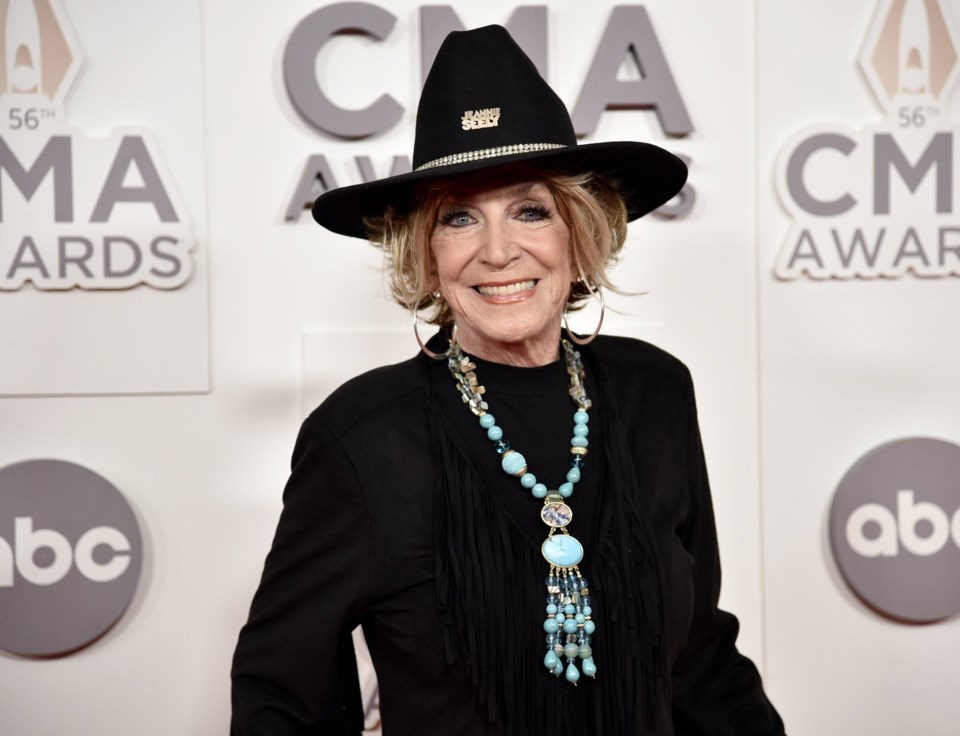NEW YORK (AP) — Jeannie Seely, the soulful country music singer behind such standards like “Don’t Touch Me,” has died. She was 85.
Her publicist, Don Murry Grubbs, said she died Friday after succumbing to complications from an intestinal infection.
Known as “Miss Country Soul” for her unique vocal style, Seely was a trailblazer for women in country music, celebrated for her spirited nonconformity and for a string of undeniable hits in the ‘60s and ’70s.
Her second husband, Gene Ward, died in December. In May, Seely revealed that she was in recovery after undergoing multiple back surgeries, two emergency procedures and spending 11 days in the ICU. She also suffered a bout of pneumonia.
“Rehab is pretty tough, but each day is looking brighter and last night, I saw a light at the end of the tunnel. And it was neon, so I knew it was mine!” she said in a statement at the time. “The unsinkable Seely is working her way back.”
Dolly Parton was one of several country music luminaries paying her tribute on Friday, saying she met Seely when they were both young and starting out in Nashville.
“She was one of my dearest friends,” Parton said on her social media accounts. “I think she was one of the greater singers in Nashville and she had a wonderful sense of humor. We had many wonderful laughs together, cried over certain things together and she will be missed."
Seely was born in July 1940, in Titusville, Pennsylvania, about two hours north of Pittsburgh and raised in nearby Townville. Her love of country music was instant; her mother sang, and her father played the banjo. When she was a child, she sang on local radio programs and performed on local television. In her early 20s, she moved to Los Angeles to kick-start a career, taking a job with Liberty and Imperial Records in Hollywood.
She kept writing and recording. Nashville was next: She sang on Porter Wagoner's show; she got a deal with Monument Records. Her greatest hit would arrive soon afterward: “Don’t Touch Me,” the crossover ballad written by Hank Cochran. The song earned Seely her first and only Grammy Award, for best country & western vocal performance in the female category.
Cochran and Seely were married in 1969 and divorced in 1979.
Seely broke boundaries in her career — at a time when country music expected a kind of subservience from its women performers, Seely was a bit of a rebel, known for wearing a miniskirt on the Grand Ole Opry stage when it was still taboo.
And she had a number of country hits in the ‘60s and ’70s, including three Top 10 hits on what is now known as Billboard's hot country songs chart: “Don't Touch Me,” 1967's “I'll Love You More (Than You Need)” and 1973's “Can I Sleep In Your Arms?”, adapted from the folk song “Can I Sleep In Your Barn Tonight Mister?”
In the years since, Seely continued to release albums, perform, and host, regularly appearing on country music programming. Her songs are considered classics, and have been recorded by everyone from Merle Haggard, Ray Price and Connie Smith to Ernest Tubb, Grandpa Jones, and Little Jimmy Dickens.
And Seely never stopped working in country music. Since 2018, she's hosted the weekly “Sunday’s with Seely” on Willie Nelson's Willie’s Roadhouse SiriusXM channel. That same year, she was inducted into the Music City Walk of Fame.
She appeared nearly 5,400 times at the Grand Ole Opry, which she has been a member of since 1967. Grubbs said Saturday's Grand Ole Opry show would be dedicated to Seely.
She released her latest song in July 2024, a cover of Dottie West's “Suffertime,” recorded at the world-renowned RCA Studio B. She performed it at the Opry the year before.
Maria Sherman, The Associated Press



